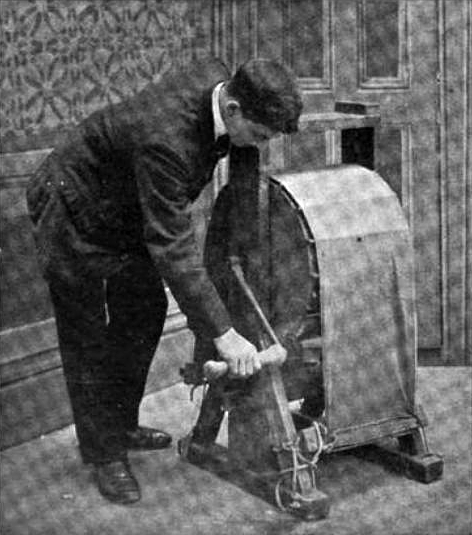Stage Sounds
by Harley Vincent
Photographs by George Newnes, Ltd.
(originally published in The Strand Magazine, 1904)
Suppose some reader of The Strand were to ask, “What is a wind-machine?” how many persons in an intelligent audience would be able correctly to answer the conundrum? Yet how often have they, in some thrilling drama at Drury Lane or one of the great London theatres, listened with sympathetic anguish to the heroine’s tearful ejaculation, “Oh, what a night! Hark to the fearful wind as it beats on yon desolate moor!” And what if, after all our straining of ears to hear the wind beating on the desolate moor (the scene, by-the-bye, of the heroine’s desertion by the villain of the play), there were nothing more realistic to reward us than the scene-painter’s gorse and heather and the proscenium lights turned low?
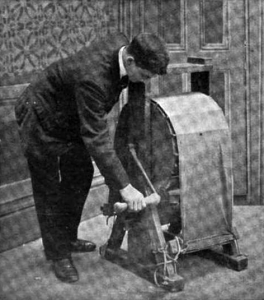
What would the murder “Macbeth” be without wind? Macbeth and his consort might act for all they were worth, if the storm didn’t “whistle” — and here is just the manager’s difficulty — round the battlements of the castle. Failing the wind the most realistic part of the spectacle would be wanting.
Of all sounds behind the stage wind is the easiest to represent. The wind-machine is the most reliable of all the complicated “theatre machinery.” In little theatres, whose audiences are wont to be highly imaginative, there are generally no wind-machines at all. The stage-manager simply goes behind and works with a big bamboo cane on the back of the curtain. The result is a sound which fairly well represents wind; that is, of course, to say if a deep howling and sobbing be not wanted.
For this latter purpose bigger theatres have their wind-machines or barrels. Just picture a huge coffee-roaster, whose sides are not “entire,” but consisting of single laths of wood, with strong silk rep bound round it. You have then an exact idea of a wind-machine. The roaster is turned and the laths stretch the silk, thus producing a rushing, whistling sound. If the silk is stretched tight the noise becomes clearer. This simple apparatus answers its object very well, if the handle is turned skilfully, first quickly, then gently, just as the wind is wont to whistle.
So, then, we will suppose that when the cue is uttered, “Hark to the fearful wind!” the property-master or his assistant takes his place at the “wings” with the machine shown in our first photograph, and works it with such verve and vigour that the house fairly shivers with cold and instinctively redoubles its commiseration for the unfortunate heroine, whose scanty raiment scarce tempers the force of the icy gale. But there are various kinds of wind. The scene may be a shipwreck, where the lad or lassie in whose fortunes the house is interested is rescued in the very teeth of a salt gale. In such a case the stage-manager will take the property-master aside and tell him that the ordinary Dartmoor breeze will not do.
“The gale I want,” he says, “must have teeth, or how is the hero to be rescued in them? I want roaring and pelting and smashing and clashing. None of your land zephyrs for me. I must hear the dolphin howl and the shark shriek!”
Whereupon the obliging and ingenious property-master, instead of tearing his hair and becoming a prey to melancholy, proceeds instantly to work to construct a windbarrel which will imitate the kind of wind demanded by the exigencies of the piece. A bag of rice will imitate a downpour of hail.
There is, in fact, no sound which a competent property-master, such as Mr. Jones, of Drury Lane Theatre, is not prepared to imitate. Some stage sounds are, of course, quite outside his domain. And the responsibility is all upon the shoulders of the stage-manager.
The poor stage-manager! As if he hadn’t enough care with what the audience hears actually on the stage without attending to so much that must be heard from behind the stage! And it must be borne in mind that in this respect nothing is unimportant and merely secondary, and also that it is a difficult business to find the best manner of adapting sounds behind the stage to what is transpiring before the eye of the audience.
Only the theatre-world knows that rhubarb has a place in the domain of stage sounds. It is traditional that the inhabitants of Meiningen, who brought stage sounds, like so many other matters, to a high degree of perfection, discovered a special use for the word “rhabarber.” For example, when a number of human voices uttered this magic word “half aloud,” the result was the most perfect representation of the murmur of a multitude conceivable.
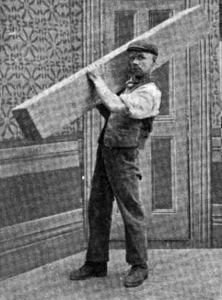
Closely allied to wind, and as commonly demanded on the stage, is the sound of rain. Roughly, rain may be said to be represented by dried peas. A handful of these are put into a monster wire sieve, which is then swung slowly to and fro. But the Metropolitan play-houses are, as a rule, better equipped. At His Majesty’s the rain-machine takes the form of a very long, narrow box, within which little ledges are nailed. If this apparatus be lifted slantwise, as is shown in the accompanying illustration, the peas roll slowly over the ledges. Thus, at the cue, “You must not stir out to-night; the rain is coming down heavily!” a rattling sound is produced very fairly representing rain. The roaring of the sea is usually a combination of rain and wind machines. But in a recent production the stage-manager was more particular. A number of “first-nighters” may recall the fiasco which occurred when the management tried to represent the roaring of the sea. Sounds issued forth which no one recognised, and the result in the long run was comic. It would have been better to forego the attempt and leave things to the imagination of the spectator. In spite of the great improvements in stage-management a great deal must yet be left to the imagination, and no one must feel aggrieved if, in the most violent storm, the leaves of trees on the stage remain unmoved. All the same, stage-management has learnt fairly well to imitate elementary sounds. Another kind of rain-machine is the rain-barrel, also used at some of the leading theatres, whose principle is the same as the one already described.
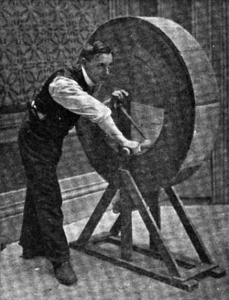
Moreover, animated Nature must also be considered. Shakespeare’s “Hamlet,” for example, requires a cock-crow. This effect has up to now been produced at one theatre by an intelligent stage workman, an excellent imitator of animals, whose cock-crow was very cleverly done, sounding as if from a long distance and producing a good effect. Cockcrowing is, moreover, now regularly paid for as a “special ” musical performance. Parrots talk in several plays, and a “full-voiced” chirping of birds occurs in one comedy. A concert of feathered songsters occurs in the second part of “Faust,” where the well-known “water-whistles” which so delighted us in our childhood are used, mingled with notes from the flute, and the imitation was very natural and life-like. In “A Midsummer Night’s Dream,” Shakespeare treats us to the lowing of the cattle. Whether this is suited by the sweet strains of Mendelssohn accompanying the representation of this scene is doubtful; at any rate, the effect is curious. In the second part of “Nibelungen” there is scarcely need to signalize Siegfried’s words, “Thou hearest the dogs will not be held in leash,” with a baying pack of hounds. The receipt for the latter is very simple. On a big wooden table, big wooden spoons are drawn to and fro. The spoons are rubbed with chalk, and must be pressed fairly hard. This is said to have originated with a gentleman whose huntsmen used to practise the trick as a hunting joke. The roaring of a lion can be imitated by a large drum, one of whose sides has been perforated and a large piece of rope introduced. The rope is then operated upon with a well-resined glove. Basses and ‘cellos represent, with deft manipulation, the effect of the “Dragon’s Den” or “Witches’ Cave,” and with this remark we come to the important part played by music behind the stage.
What is the use of music behind the stage? The first reply is that, in melodrama, it gives results unobtainable through the orchestra. Sometimes the object aimed at is to present to the audience sounds which travel from a distance. At other times the audience is made to believe that sounds really executed behind the stage proceed from a dummy instrument in the hands of an actor, the necessity in this case, of course, arising from the fact that the actor cannot play the instrument in question. Of course, if every minor character on the stage who carries a musical instrument could play the same there would be no difficulty, whereas the fact is that numbers of characters who come before the footlights with musical instruments are merely supers, or theatre-workmen with insufficient musical ability. The instruments, too, range over periods of almost infinite remoteness, such as in the plays of “King Lear” and “Coriolanus,” and anachronisms must be avoided at all costs. In “King Lear,” for example, a jovial modern trumpeter, even although able to blow his own modern instrument, is a sheer anachronism. Hence it comes to pass that the manager with an eye to artistic effect puts a properly-costumed super, with a dummy instrument of the right period, on the stage and produces the actual musical sound from behind the wings. In the case of a musical procession with dummy instruments moving to and fro on the stage, of course the real players behind the stage keep moving in similar directions, though, in this case, the result is not perfect. Fortunately, many spectators do not trouble themselves much about these little inconsistencies.
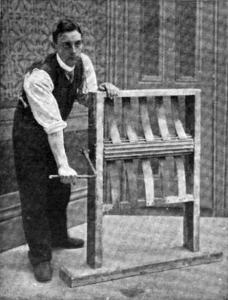
Few sounds on the stage, especially in farce and farcical comedy, are more familiar than the crash of broken glass. There are doubtless many charming ladies extant who fondly believe that the cost of window-panes to the management must be a serious item when the low comedian and his victims have to be ejected via the window many times in the course of an evening. As a matter of fact, two baskets, one half full of broken china, are usually all that is required, the contents of the one being poured into the other. If a dreadful crash is demanded, a sackful of scollop-shells will represent it with most alarming accuracy. But theatrical science at Drury Lane goes farther than this, and we have a “crash” machine, fitted with ten resonant slats actuated by a cogged cylinder. Our illustration shows the machine and the manner in which it is worked at the wings whenever a scene of stage violence takes place which calls for its employment.
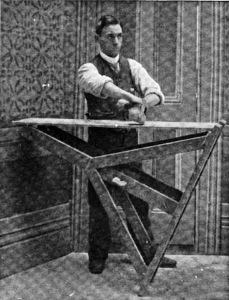
In plays of the “Miss Elizabeth’s Prisoner” type, where the clatter of a horse’s hoofs is demanded, the effect is realized by two hoof-shaped blocks of wood struck upon a slab of stone. The blocks are fastened to the wrist, and if several horses are to be represented two supernumeraries or stage-hands are called into requisition. Another form, used at the Alhambra Theatre, for example, is also shown in the illustration reproduced on the next page. This instrument somewhat resembles a pair of compasses, but the effect is highly realistic.
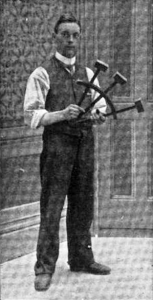
“Good-bye, Kate!” “Good-bye, Jack, and God bless you!” “Right away, there! Stand back, please!” The last carriage door is closed with a bang, there is a burst of cheering from the crowd, a little strip of scenery begins to move, a light puff of smoke is seen, and the Dover Express is off. But these details would be nothing if we did not hear it speeding away. Invisible to the audience sits the inevitable stage-hand with two pieces of glasspaper, working them diligently. “Puff-puff, puff-puff!” and so the effect is produced.
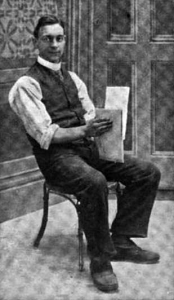
For thunder there are four arrangements. The primitive one is the “thunder-plate,” a very long and slender plate which hangs loose on a string and is set working at the lower extremity. The rattling noise which immediately follows a flash of lightning is thus fairly well produced. For rolling, distant thunder there is a gigantic kettle-drum covered with an ass’s skin, and worked with two vigorous beaters. In the older theatres a “thundercarriage ” is still met with; that is, a cart loaded with stones, and drawn this way and that over the floor. The “thunder-clap,” however, is the chef d’Å“vre. This is produced by a rectangular wooden pit reaching from the “loft-of-the-stage-for-scenic-machinery” to the podium. The inner sides are provided with irregularly constructed cross-laths, over which stones thrown down from above clatter. If the manager desires a specially severe storm he gives a vigorous turn to the huge rattle at the same time, thus representing the crashing of broken-in doors, whilst if the rattle is turned slowly the effect is that of far-off musketry fire.
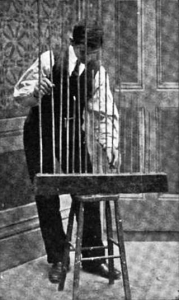
Amongst the apparatus for imitating music in general use is the “distant chime machine,” which consists of a set of pine spindles worked upon by resined fingers, producing a realistic chime. Another is the “wedding bells machine,” or “peal of bells,” operated as shown in the illustration below.
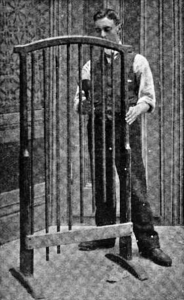
…
The latest recruit to stage mechanics is the phonograph, which has recently been introduced in Berlin. It proved a grand success, the first attempt being made in Shakespeare’s “King Henry V.,” a drama in which the din of battle is especially prominent. One who was present declares that not a soul noticed that in place of human voices a piece of pure mechanism was at work. Instead of thirty “supers” crowded together and blocking up each other’s way behind the wings there was a little table, with an apparatus which could be shifted from one place to another at a moment’s notice. And how faithful to his task was this new colleague! No disturbance now would arise owing to awkwardness or to the fault of some malevolent super or untimely wag. The innovation is likely to spread, and will surely prove a considerable economy for the smaller theatre, where the outlay on stage noises of the human and musical sort is no trifle.
reprinted from “Stage Sounds” by Harley Vincent. The Strand Magazine,Vol. 28, 1904, (pp. 417-422)

